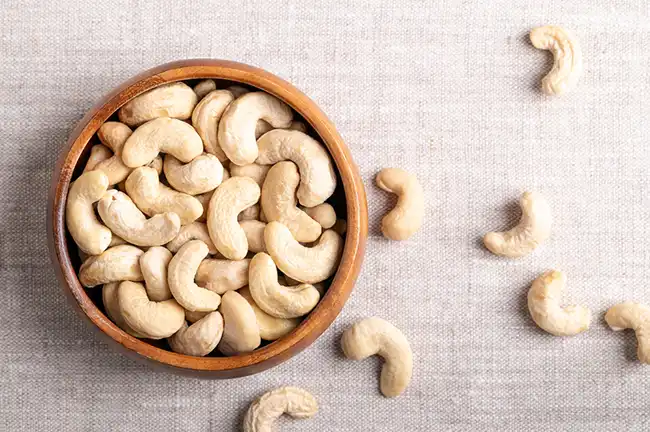
Can Dogs Eat Cashews? Yes, cashews are generally safe for dogs to eat, unlike macadamia nuts, which are toxic to them. However, while cashews aren’t harmful in moderation, there are important guidelines to follow when offering them to your pup. Cashews are high in fat and calories, so it’s essential to serve them in small amounts and ensure they are unsalted and unseasoned. By keeping these precautions in mind, you can safely share a cashew or two with your dog as an occasional treat.
Can Dogs Eat Cashews?
Yes, dogs can eat cashews in moderation, but there are some risks to be aware of, including pancreatitis, obesity, choking hazards, and salt toxicity.
While cashews are nontoxic to dogs, they do come with some risks that pet owners should consider. Cashews are high in fat and protein, which can cause digestive issues if fed in large quantities. High-fat foods like cashews can lead to pancreatitis, a potentially life-threatening condition that requires immediate veterinary care. Additionally, frequent consumption of fatty foods can contribute to obesity, increasing your dog’s risk of developing conditions like diabetes or joint problems.
Another concern is the presence of other nuts in cashew mixes, especially during the holiday season when variety packs are common. Some nuts, such as macadamia nuts, are toxic to dogs, and all nuts can be choking hazards. This is particularly dangerous for small dogs, but large breeds can also be at risk, especially if the nuts are large or hard to chew.
Lastly, cashews are often salted, and too much salt can lead to salt toxicity. Symptoms of salt toxicity in dogs include vomiting, weakness, diarrhea, muscle tremors, and in severe cases, seizures. To keep your dog safe, limit their intake of cashews and ensure they are unsalted, served in small amounts. Always consult your veterinarian before introducing any new food into your dog’s diet.

3 Health Benefits of Cashews for Dogs
While cashews are not high in fiber, they are packed with beneficial nutrients that can support your dog’s overall health. Here are some of the key benefits of offering cashews as an occasional treat:
- Rich in Essential Nutrients: Cashews are a great source of protein and provide vital nutrients such as vitamin K, which supports blood clotting and bone health. Vitamin K may also help reduce the risk of certain cancers. Additionally, cashews are loaded with important minerals like calcium, copper, magnesium, iron, manganese, phosphorus, and zinc, which contribute to your dog’s healthy growth and vitality.
- Antioxidant Support: Cashews are rich in antioxidants, which play a crucial role in protecting your dog’s body from oxidative stress. These antioxidants help support heart health, protect against inflammation, and may lower the risk of certain cancers, contributing to a longer, healthier life.
- Omega-3 and Omega-6 Fatty Acids: These healthy fats help regulate your dog’s immune system and manage inflammation. Omega-3 and omega-6 fatty acids also promote a shiny, healthy coat and skin, giving your dog a lustrous, smooth appearance while keeping irritation and dryness at bay.
Remember, while cashews offer several health benefits, they should be given in moderation to avoid potential risks.
5 Risks of Feeding Dogs Cashews
While cashews can be a nutritious snack in moderation, feeding too many to your dog can lead to several health issues. Here are five potential risks to be aware of:
- Gastrointestinal Distress: Cashews are rich in protein and fat, which can be too rich for your dog’s stomach. Overindulgence may lead to digestive upset, causing symptoms like vomiting, diarrhea, or bloating, particularly if your dog consumes a large quantity at once.
- Obesity: Due to their high calorie content, cashews can contribute to weight gain if fed too frequently. Regularly offering these fatty treats can increase the risk of obesity, which can lead to other health problems like joint issues, diabetes, and reduced mobility.
- Pancreatitis: Cashews’ high fat content can put extra strain on your dog’s pancreas, which is responsible for processing fats. Overloading the pancreas can lead to inflammation, known as pancreatitis, a potentially life-threatening condition that requires immediate veterinary attention.
- Allergic Reactions: Although rare, some dogs may be allergic to cashews. Symptoms of an allergic reaction include itching, hives, or swelling. Always monitor your dog closely the first time you offer any new food, including cashews, to ensure they don’t experience an adverse reaction.
- Bladder Stones: Cashews contain oxalates, compounds that can contribute to the formation of bladder stones. High oxalate intake, especially in larger quantities, can increase your dog’s risk of developing painful urinary issues, so it’s important to keep cashew consumption to a minimum.
To keep your dog safe, it’s crucial to offer cashews sparingly and observe how they react to this treat. If in doubt, consult with your veterinarian before introducing new foods to your pet’s diet.
Related Post: Can Dogs Eat Brazil Nuts? Risks & Safety Explained
How to Safely Feed Your Dog Cashews
If you’re offering your dog cashews for the first time, it’s essential to monitor their reaction closely and watch for any signs of an allergic reaction. Here are some important guidelines to follow to ensure you’re feeding cashews safely:
- Check for Mold: Cashews can sometimes harbor mold, which may contain aflatoxin, a toxic substance that can lead to digestive issues and even more serious health problems. Always inspect the nuts carefully before giving them to your dog.
- Choose Plain, Raw or Roasted Cashews: Stick to simple, unsalted cashews that are either raw or roasted. Many commercially available nuts are salted or flavored with additives that are harmful to dogs. Avoid cashews with any seasoning or extra flavorings, as these can upset your dog’s stomach or lead to more serious health concerns.
- Remove the Shells: Always make sure the cashews are free from shells or shell fragments. Cashew shells are not only tough and hard to digest, but they also contain anacardic acid, a potentially toxic substance. Shells can also be a choking hazard, especially for smaller dogs.
- Feed in Moderation: Cashews should only make up a small part of your dog’s diet. Following the “10 percent rule” is key—only 10% of your dog’s diet should come from treats or snacks, including cashews. The remaining 90% should come from their regular, balanced, vet-approved dog food.
By following these simple guidelines, you can safely incorporate cashews into your dog’s diet as an occasional treat, ensuring they get the nutritional benefits without the risks. Always consult your vet if you’re unsure about adding new foods to your dog’s routine.
Can You Feed Your Dog Cashew Milk and Cashew Butter?
Both cashew milk and cashew butter can be safe for dogs when given in moderation. Like the whole nuts, these cashew-based products are generally fine in small amounts. However, it’s important to check the ingredients carefully before sharing them with your pup. Many nut butters, for instance, contain xylitol, a sweetener that is highly toxic to dogs. Additionally, added oils and excessive sugars can lead to digestive issues or unhealthy weight gain, so it’s best to choose plain, unsweetened options without any harmful additives.
Before Sharing with Your Dog
While some human foods may be safe for dogs, others can cause adverse reactions. Always consult with your veterinarian before introducing any new food into your dog’s diet. This article is intended for educational purposes only and should not replace professional medical or dietary advice.
FAQ.
Can dogs safely eat cashews?
Yes, dogs can eat cashews! Unlike macadamia nuts, which are toxic, cashews are generally safe. But before sharing, there are a few things to keep in mind—like portion size and avoiding added salt or flavors. A few plain cashews here and there are fine, but moderation is key!
Are cashews good or bad for dogs?
Cashews aren’t toxic to dogs, but they can be bad if overfed. Their high fat content may lead to weight gain, pancreatitis, or digestive issues. Salted or flavored cashews can also cause dehydration. To be safe, only offer plain, unsalted cashews in small amounts—or avoid them altogether.
How many cashews can a dog eat?
Small dogs can have one to two cashews, while larger dogs can eat up to five to ten in a day. Cashews should be an occasional treat, making up no more than 10% of daily calories. Always choose plain, unsalted cashews and watch for any signs of stomach upset.
What happens if my dog eats too many cashews?
If a dog eats too many cashews, they may have vomiting, diarrhea, or stomach pain due to the high fat content. Over time, this can lead to pancreatitis, weight gain, or diabetes. Always feed plain, unsalted cashews in small amounts and watch for any signs of digestive issues.
Are cashews toxic to dogs?
No, cashews aren’t toxic to dogs, but they’re high in fat and can cause digestive issues if overfed. Always choose plain, unsalted cashews and feed them in moderation. Watch for signs of stomach upset like vomiting or diarrhea, and avoid cashews if your dog has pancreatitis or weight issues.
Can puppies eat cashews?
Yes, puppies can eat plain, unsalted cashews, but only in tiny amounts. They can be a choking hazard and may cause stomach upset or allergies. Always introduce new foods slowly and consult your vet before feeding cashews to ensure they’re safe for your puppy’s diet.



